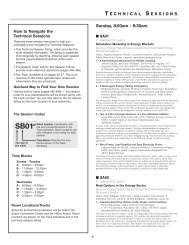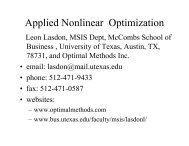Sunday
Sunday
Sunday
You also want an ePaper? Increase the reach of your titles
YUMPU automatically turns print PDFs into web optimized ePapers that Google loves.
SB06<br />
■ SB06<br />
06- West 103 B- CC<br />
Analysis of Steady-State Simulation Output<br />
Processes<br />
Sponsor: Simulation<br />
Sponsored Session<br />
Chair: Emily Lada, Operations Research Specialist, SAS, SAS Campus<br />
Dr., Cary, NC, 27513, United States of America, Emily.Lada@sas.com<br />
1 - Evaluation of Batched Quantile Estimation Methods<br />
Dave Goldsman, Georgia Institute of Technology, School of ISYE,<br />
Atlanta, GA, 30332, United States of America, sman@gatech.edu,<br />
Christos Alexopoulos, James Wilson<br />
We study the performance of asymptotically valid confidence intervals (CIs)<br />
methods for steady-state quantiles computed from nonoverlapping batches. Our<br />
results form the basis for the development of fully sequential procedures that<br />
yield CI estimators of steady-state quantiles with user-specified absolute or<br />
relative precision.<br />
2 - Initialization of Finite-horizon Simulations<br />
Peter Glynn, Professor, Stanford University, Huang Engineering<br />
Center, Stanford, CA, 94305, United States of America,<br />
glynn@stanford.edu, Eunji Lim<br />
We introduce a new type of initialization problem that arises in real-time<br />
simulations. In such applications, the state needed to initialize the simulation is<br />
not completely observable, either because monitoring the physical system does<br />
not provide complete information or because the model includes artificial states<br />
that are not observable. We discuss the new initialization issues, make<br />
connections to the filtering literature, and present two algorithms to address these<br />
issues.<br />
3 - The Simulation Start-up Problem: Performance Comparison of<br />
Recent Solution Procedures<br />
James Wilson, Professor, Edward P. Fitts Department of Industrial<br />
Engineering, North Carolina State University, Raleigh, NC, 27695-<br />
7906, United States of America, jwilson@ncsu.edu, Anup Mokashi,<br />
Emily Lada<br />
We summarize the results of a comprehensive experimental performance<br />
comparison of some recent procedures for solving the simulation start-up<br />
problem, including the methods incorporated in MSER-5, N-Skart, waSSP, and<br />
SBatch. Substantial differences in performance are observed, especially in<br />
comparisons of MSER-5 with the latter three procedures.<br />
■ SB07<br />
07- West 104 A- CC<br />
INFORMS DM Student Paper Award Competition<br />
Sponsor: Data Mining<br />
Sponsored Session<br />
Chair: Peter Qian, University of Wisconsin, Madison, WI,<br />
United States of America, peterq@stat.wisc.edu<br />
1 - INFORMS Data Mining Best Student Paper Competition<br />
Peter Qian, University of Wisconsin, Madison, WI,<br />
United States of America, peterq@stat.wisc.edu<br />
Four selected finalists will present their papers in the INFORMS DM Best Student<br />
Paper competition. The winner will be announced at the INFORMS DM business<br />
meeting and all finalists will receive an award certificate.<br />
■ SB08<br />
08- West 104 B- CC<br />
Joint Session Doing Good with Good OR/SPPSN:<br />
Doing Good with Good OR Competition:<br />
Finalist Presentations I<br />
Cluster: Doing Good with Good OR Student Competition & Public<br />
Programs, Service and Needs<br />
Invited Session<br />
Chair: Sila Cetinkaya, Texas A&M University, College Station, TX,<br />
United States of America, sila@tamu.edu<br />
INFORMS Phoenix – 2012<br />
82<br />
1 - The Effect of Budgetary Restrictions on Breast Cancer<br />
Diagnostic Decisions<br />
Mehmet Ayvaci, Assistant Professor, The University of Texas at<br />
Dallas, Jindal School of Management, 800 West Campbell Road,<br />
Richardson, TX, 75080, United States of America,<br />
ayvaci@wisc.edu, Elizabeth Burnside, Oguzhan Alagoz<br />
We develop a finite-horizon constrained Markov Decision Process to model<br />
diagnostic decisions after mammography where we maximize the total expected<br />
quality adjusted life years (QALYs) of a patient under resource constraints.<br />
Comparing to actual clinical practice, using optimal thresholds may result in 22%<br />
cost savings without sacrificing QALYs. Our modeling framework could be used<br />
for evaluating cost-effectiveness of diagnostic procedures.<br />
2 - Dynamic Monitoring of Chronic Disease<br />
Jonathan Helm, Assistant Professor, Indiana University, Kelley<br />
School of Business, ODT, 1309 East Tenth Street, Bloomington, IN,<br />
47405, United States of America, jhelm@umich.edu, Gregg Schell<br />
This research develops new methods for dynamically monitoring chronic disease<br />
to allow better detection of disease worsening with fewer tests. We developed a<br />
prototype and tested it on a major clinical trial with results that significantly<br />
outperform current practice. Our team, including engineers, a clinician, and an<br />
epidemiologist, is working toward integrating our algorithms into widely used<br />
glaucoma testing machines.<br />
3 - Optimal Distribution of Medical Backpacks and Health<br />
Surveillance Assistants in Malawi<br />
Amber Kunkel, Rice University, 6100 Main Street, Houton, TX,<br />
77005, United States of America, agkunkel@gmail.com,<br />
Elizabeth Van Itallie, Duo Wu<br />
The Malawian people face severely limited healthcare access. To address this<br />
issue, we used large-scale p-median and capacitated facility location problems to<br />
create a scalable, three-tiered plan for optimal allocation of Health Surveillance<br />
Assistants (HSAs), HSA designated medical backpacks, and backpack resupply<br />
centers in Malawi. This plan will be used to direct the Beyond Traditional Borders’<br />
HSA backpack program scale-up.<br />
■ SB09<br />
09- West 105 A- CC<br />
Neurophysiology and Decision Making<br />
Sponsor: Multiple Criteria Decision Making<br />
Sponsored Session<br />
Chair: Niklas Ravaja, Professor, Aalto University, School of Economics,<br />
P.O. Box 21255, Helsinki, 00076, Finland, ravaja@mappi.helsinki.fi<br />
1 - Neurophysiological Methods in Decision Making Research<br />
Niklas Ravaja, Professor, Aalto University, School of Economics,<br />
P.O. Box 21255, Helsinki, 00076, Finland,<br />
ravaja@mappi.helsinki.fi, Pekka Korhonen, Outi Somervuori,<br />
Jyrki Wallenius, Murat Koksalan<br />
Neurophysiological or psychophysiological measures, such as<br />
electroencephalography (EEG), facial electromyography (EMG),<br />
electrocardiography (ECG), and electrodermal activity (EDA), have attained<br />
increasing attention in studying emotional and cognitive processes during<br />
decision making. This presentation will discuss the use of these measures. In<br />
addition, some recent decision making studies employing neurophysiological<br />
measures will be presented.<br />
2 - Purchase Behavior and Psychophysiological Responses to<br />
Different Price Levels<br />
Outi Somervuori, Aalto University School of Economics, 00076,<br />
Finland, outi.somervuori@aalto.fi, Niklas Ravaja<br />
The aim of the study was to examine emotional processes in purchase decision.<br />
The participants were presented purchase decision trials with 14 different<br />
products whose price levels were changed while their facial electromyography<br />
(EMG) and electrodermal activity (EDA) were recorded. The results suggest that<br />
low prices and national brand products induce higher positive emotions compared<br />
to high prices and private label products. Also, positive emotions are related to<br />
greater purchase intent.



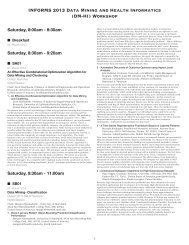
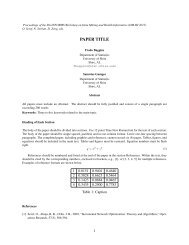
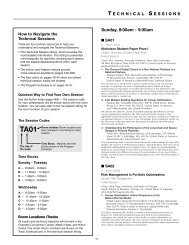
![[PDF] Charlotte Back Matter](https://img.yumpu.com/17933057/1/190x245/pdf-charlotte-back-matter.jpg?quality=85)
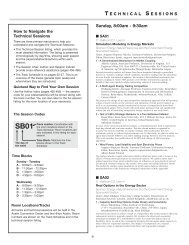
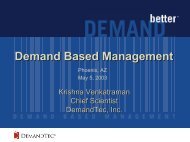
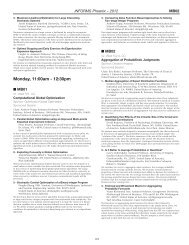
![[PDF] ALIO Back Matter](https://img.yumpu.com/17932960/1/190x245/pdf-alio-back-matter.jpg?quality=85)
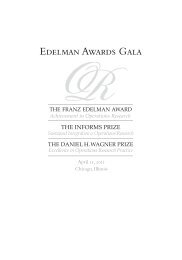
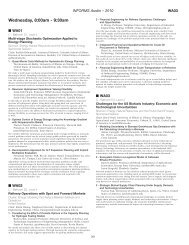
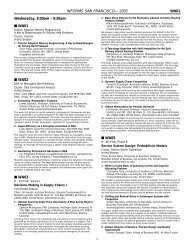
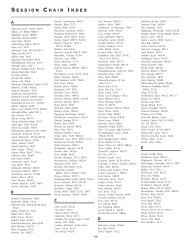
![[PDF] Monday, 8:00am - 9:30am](https://img.yumpu.com/17932954/1/190x245/pdf-monday-800am-930am.jpg?quality=85)
